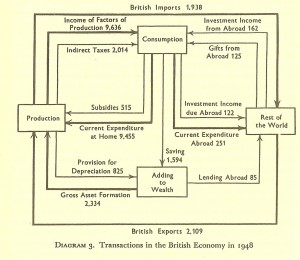I’ve been reading this morning Richard Stone’s 1948/49 Newmarch Lectures, [amazon_link id=”0751201863″ target=”_blank” ]The Role of Measurement in Economics[/amazon_link]. There really, truly is nothing new under the sun. He writes in the conclusion about the ‘undue exclusiveness sometimes to be observed in economists’:
“The determination to deal only with the economic aspect of problems doubtless makes for tidy theories and all the pleasures of staying on home ground. But inasmuch as the economic aspect is only part of most actual problems, its single minded pursuit leads to distortion and incompleteness. This is particularly so at the present time when social influences are again coming to play a larger part in shaping the changes in society than they did in past eras… The moral seems to be not less specialization but more co-operation and understanding between economists and those who work in other branches of the social sciences.”
He also – as could be expected from such a leading figure in developing the modern system of national accounts – advocates the collection of adequate statistics for empirical understanding. (And the need to educate the general public in some fundamentals of statistics so that everyone understands there is a margin of error.)
Lastly, Stone strongly urges the need to combine empirical and theoretical approaches to economics. Theory versus measurement is a false dichotomy, and theory without measurement uninteresting.

British Economy, 1948
